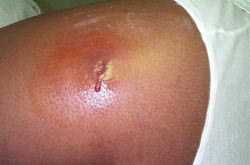Temple Emergency Medicine receives $1.8M to find best MRSA treatment
 Photo courtesy Centers for Disease Control
Doctors are still unsure of the best treatments for MRSA, which currently includes draining of the abcess as shown above in an infected leg. The STOP MRSA study will seek the optimal treatment for MRSA in outpatients.
|
Temple’s Department of Emergency Medicine will participate in a nationwide study to pinpoint the best treatment for community-acquired MRSA, an increasingly common, antibiotic-resistant infection.
“The objective of this trial is to determine the best outpatient therapy for otherwise healthy people who have MRSA,” said David Karras, professor and associate chair of emergency medicine at the School of Medicine and Hospital, who will lead the research efforts at Temple. “There is no information on the optimal treatment for this latest strain, which is resistant to many of the traditional oral antibiotics.” |
|
As one of four subcontractors nationwide and the only site in Philadelphia, Temple will receive $1.8 million in funding from the Olive View-UCLA Education and Research Institute, the lead investigator for STOP MRSA*, a $9 million, five-year, five-center trial funded by the National Institute of Allergy and Infectious Diseases, part of the National Institutes of Health. STOP MRSA will evaluate various treatments for patients with skin and soft tissue infections caused by community-acquired-MRSA. Current treatments for MRSA include a variety of antibiotics and the draining of abscesses, but experts are not yet certain about the most effective treatment. Karras also noted that another goal of the study is to gain approval from the Food and Drug Administration for the use of generic antibiotics to treat MRSA infections, which would offer patients a low-cost treatment option. “For decades, MRSA was considered an uncommon infection in healthy individuals,” said Karras. “But by 1996, otherwise healthy children and adults began to get MRSA infections for no apparent reason. Over the next six years, MRSA went from a rare community-associated disease to one of the most common forms of skin infection,” he said, adding that many people carry the MRSA bacteria without developing an infection. MRSA infections generally begin as a pimple before becoming an abscess, also called a boil. The skin often becomes red, tense and painful, a condition known as cellulitis. There may be pus drainage. Karras noted that patients often seek treatment for what they believe is a spider bite, only to find that they have an MRSA infection. “Patients can think that they’re suffering from insect bites, so they scratch and spread the bacteria to smaller cuts on other parts of their body without realizing it. They come to the emergency room with several welts, not realizing that the bumps are actually skin infections,” Karras said. In many urban areas, including Philadelphia, patients will visit the emergency room instead of a doctor’s office. For this reason, emergency medicine has been on the front lines of community-acquired MRSA prevention and treatment. Close skin-to-skin contact, cuts or abrasions, contaminated items and surfaces, crowded living conditions and poor hygiene can promote the spread of MRSA. Experts advise the following precautions: If a member of a household has an abscess, cellulitis or draining wound, he or she needs to see a doctor immediately. Additionally, linens should be segregated to protect uninfected members of the household. For general hygiene and infection control, do not share personal items such as razors. Keep hands clean by washing thoroughly with soap and water or using an alcohol-based hand sanitizer. Keep cuts and scrapes clean and covered with a bandage until healed and avoid contact with other people’s wounds or bandages. *Strategies using off-patent antibiotics for community-acquired methicillin-resistant Staphyloccus aureus (CA-MRSA) |
|